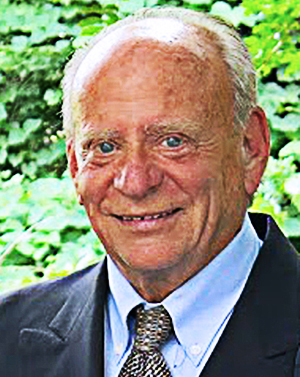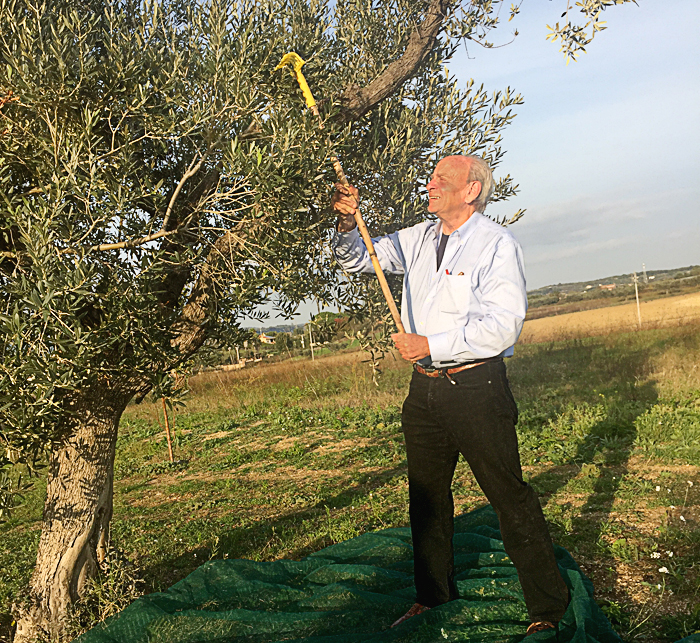
Brooklyn native and successful dentist in Westchester County, Charles Randolph discovered
the spirit of old Brooklyn in Ladispoli, Italy. He bought a small house next to an olive grove on the Mediterranean shore west of Rome and learned how to make olive oil.
Brooklynites in Rome: Special to the Brooklyn Daily Eagle
By Palmer Hasty
Charles Randolph was born in 1944 at 856 East 15th Street between Avenues I and H in Flatbush. He lived there until he went to graduate school at NYU to study dentistry. He is a Brooklyn College alum with a BS in Chemistry. Randolph has maintained his dental practice in Westchester County since 1971.
In the late 1980s, as part of a deal between the New York and Italian Trade Commissions, he commuted to a dental clinic in the Parioli section of Metropolitan Rome to help patients with TMJ (jaw bone joint) issues and orthopedic training.
Eventually, Randolph bought a home in Ladispoli, a town in the Province of Rome about 25 miles west of Central Rome, on the Mediterranean Sea.
Later, after his divorce, when Randolph planned to sell his Italian home, a group of local Italian friends converted a small shack on the edge of an olive grove into a one-bedroom apartment in a successful attempt to give Randolph a reason to keep a residence there and return to the small Mediterranean town. It was during the time he spent at his apartment in Ladispoli that Randolph learned to harvest olives and make olive oil.

Randolph also started his own Mobile Dental Service here in the states that caters to the poor communities in upstate New York and drug rehab centers in Brooklyn, providing dental service to poor people who otherwise could not afford quality dental care.
In a recent interview with the Brooklyn Eagle, Randolph talked about his career as a Westchester County dentist, his childhood in an all Italian neighborhood in Flatbush, and the time he has spent, and still spends today, in a small, beautiful Italian town on the Mediterranean.
BE: Did you have a lot of high-profile clients as a dentist in Westchester County?
CR: Yes, you could say that. I had a lot of patients who were politicos, TV people and models. Former New York Gov. George Pataki was a client. I don’t think the governor would mind my mentioning him, but I don’t really like name dropping, although I can tell you that a lot of people you see on TV, so to speak, have my teeth.
BE: What made you set up a Mobile Dental Company?
CR: The governor asked us what we could do about the underprivileged and underserved in upstate New York. So 11 years ago, I started a Mobile Dental Company. We went upstate; we were the only game in town. I don’t know if you are aware of it, but upstate New York is considered one of the poorest areas of the country…including the Appalachia area.
The politicians made it so hard for doctors to work on those people. We take the van and take care of people; otherwise, they wouldn’t get any care. Of course ,we don’t make a fortune from it, but I will tell you one thing, you get kissed and hugged every day … as opposed to Westchester, where all they want to do is complain. The people [upstate] really appreciate what you do.
BE: What took you to Italy?
CR: In the late 1980s, the Italian Trade Commission asked the New York Trade Commission if anybody wanted to help this clinic in Parioli, Rome. It’s the Beverly Hills of Rome; that’s the best way to describe it. It’s a clinic run by Anthony Bricella; he needed some help. He knew some people in the New York government and asked if I would like to come over and help him out and teach in his clinic…and I said of course. So I went over and ended up buying a home there, and for 13 years I commuted to Rome every month except August.
BE: Where is your home in Italy?
CR: It’s in Ladispoli, about 25 minutes outside of Rome, a little north and a little west, right on the Mediterranean. I used to teach at NYU and a student of mine married a girl from there. They invited me to come to Ladispoli the next time I was in Italy, and I fell in love with it.
BE: You said the Ladispoli community reminded you of Brooklyn. What did you mean?
CR: I developed wonderful life-long relationships there.
I had divorced and didn’t want to live there by myself, so I decided to sell the place. The Italians, being what they are, being who they are, my friends were so afraid that I wouldn’t come back they got some property from a mutual friend, a gentleman who didn’t need it, and they actually started building a house for me, for free. You know, so that I would come back. I mean, who does that?
Having grown up in an all Italian block in Brooklyn, the people there reminded me of the people in Brooklyn where I grew up. The Italians are very nice, sweet people. The only way I can describe that town would be Brooklyn in the 1950s.
BE: So what was it like growing up in Flatbush?
CR: It was fabulous growing up in Brooklyn back then. We had the Dodgers. I grew up on a dead end street where the traffic was limited, so we did just about everything in the street. We had mapped out a punch ball court. We played stickball and had track events in the streets.
It was an all Italian neighborhood, there was always the smell of garlic around. We were one of two Jewish families on the street. Everybody knew everybody else and we all watched out for each other. Like I said, that’s the reason I loved Ladispoli so much — it reminded me of Brooklyn in the ’50s. When I was in high school, I belonged to a place called Brighten Private…it was a very inexpensive Beach Club, a great place to go during the summertime. They had music and dancing and we were always trying to pick up girls and stuff.
BE: Did you say you were raised by your mother?
CR: I was mostly raised by my mother. My father, Peter Randolph, died on my 12th birthday. He was a talented painter and design engineer. He was from Montreal and my mother was from London. They met in Brooklyn in their early 20s. She was a stay-at-home mom until my father died and she went to work for Traveler’s Insurance, so we didn’t have a lot money.
I remember she used to send me to the bakery on Avenue J for a loaf of rye bread, and she learned soon enough that she had to buy two loaves, because — I couldn’t help it — I always ate some of the fresh bread on the way home. A lot of us kids didn’t have much money. We did all kinds of things to make money, even the classic lemonade stands…it really was like a Norman Rockwell painting.
BE: Many people I’ve interviewed for this series who grew up in the 1950s always talk about how different it was back then.
CR: Absolutely. It’s amazing how different it was in the 1950s. At 12, we’d take the trains by ourselves to Brighten Beach, Coney Island, even Times Square. You didn’t even think about something bad happening.
BE: And the Dodgers?
CR: We went to see the Dodgers all the time. It costs 50 cents to sit in the bleachers in right field. As a kid, one of the greatest things was [that] the ball players lived in your neighborhood. It’s not like that today. I remember we could go over to Gil Hodges’ house and get an autographed baseball whenever we wanted to. He was nice enough to come to the door himself and give us autographs.
I remember the first time they won the World Series. It was totally crazy. I remember the game was over, and all the guys on my block, we were playing ball in the street, and this car came by with Dodger signs all over it, and we were cheering Go Brooklyn…Go Brooklyn! Suddenly, whoever was in the car rolled down the window and started throwing money at us, literally — he must’ve won the biggest bet in the world.

that Charles Randolph produced
BE: You said you’ve done some film producing. What is the film about that you recently produced?
CR: I’ve actually produced two movies. One is a short film, and we just finished a feature film, “American Fango.” It’s directed by my best friend who lives in Italy, Gabriele Altobelli. We shot it in Rome, Los Angeles and New York.
It’s actually a true story, about when he was a young actor and what happened to him. How he was lured to California and dumped by a girl and made it back to New York and lived in Brooklyn for a while. It’s a romantic comedy. We’ve just started the process of trying to get distribution for it. The film just won an Award of Merit in California at the Indie Fest.
Photos courtesy of Charles Randolph.
Charles Randolph headshot.
Charles Randolph harvesting olives.
You can read about American Fango at this link:
http://www.imdb.com/title/tt4856092/